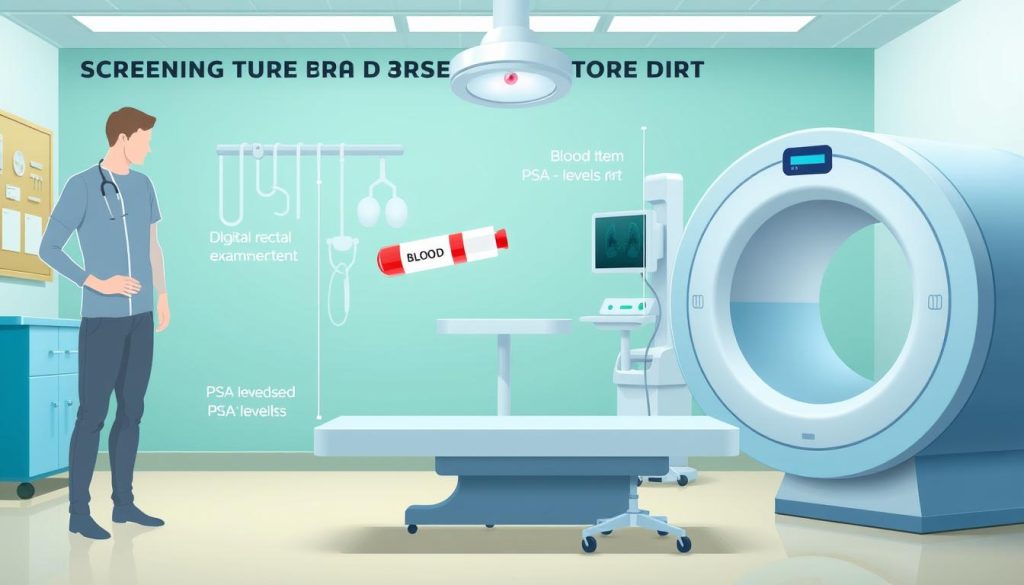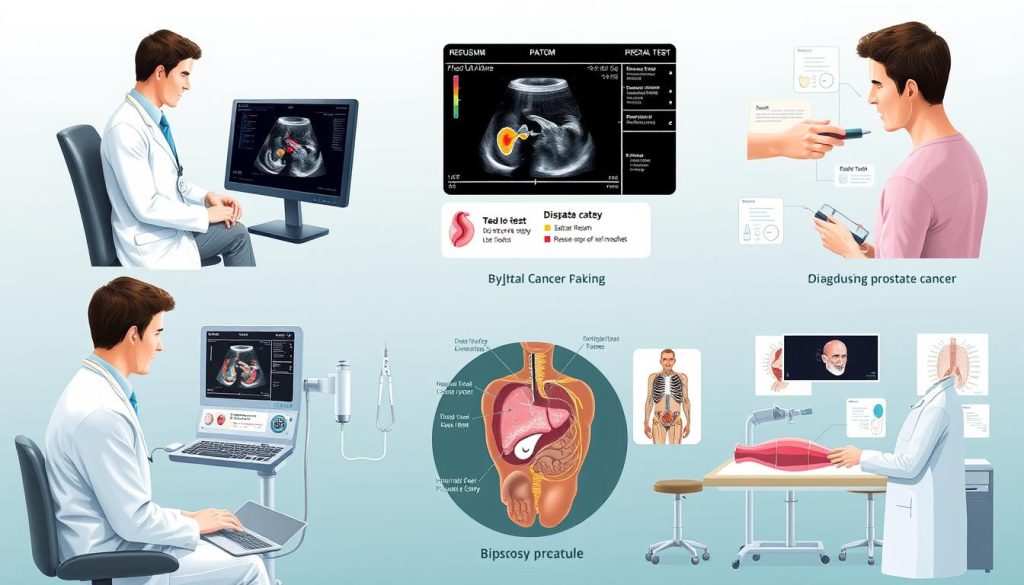Diagnosing prostate cancer begins with noticing symptoms and getting medical help. Early detection is key to effective treatment. This guide will walk you through from first signs to advanced tests, helping men take control of their health.
Knowing about different screening methods is vital for catching prostate cancer early. From blood tests to high-tech scans, each step helps us understand more. Let’s explore how today’s medicine finds this common cancer in men.
Understanding Early Warning Signs and Symptoms of Prostate Cancer
Spotting prostate cancer symptoms early is crucial. Men should watch for body changes and get medical help if they notice anything odd.
Common Physical Symptoms to Watch For
Prostate cancer often grows slowly without clear signs. Yet, some men might feel:
- Pain or discomfort in the pelvic area
- Bone pain, especially in the lower back, hips, or chest
- Unexplained weight loss
- Erectile dysfunction
Urinary Changes and Warning Signs
Urinary changes can signal prostate problems. Look out for:
- Frequent urination, especially at night
- Difficulty starting or stopping urination
- Weak or interrupted urine flow
- Burning sensation or pain during urination
If you see these signs, don’t worry yet. They might not mean cancer. But, they do need a doctor’s check. Early detection blood tests can spot issues early.
When Symptoms Require Immediate Medical Attention
Some symptoms need quick action. Get help right away if you have:
- Blood in urine or semen
- Sudden inability to urinate
- Severe pain in the lower back or pelvic area
Early detection is vital. If you see any warning signs, see your doctor. Regular check-ups and body awareness are key to prostate health.
How Do You Diagnose Prostate Cancer: Step-by-Step Process
Diagnosing prostate cancer involves several steps. These steps aim to find and check any unusual signs. They use different screening and diagnostic methods to get accurate results.
Initial Screening and Consultation
The first step is a consultation and initial screening. Your doctor will talk about your health history and do a physical exam. This exam often includes a digital rectal exam (DRE) to feel for any unusual growths in the prostate gland.

Advanced Diagnostic Procedures
If the first screening shows concerns, your doctor might suggest more tests. These tests include:
- Prostate-Specific Antigen (PSA) blood test
- Transrectal ultrasound
- Prostate biopsy
These tests give important info about your prostate’s health and if there are cancer cells.
Understanding Test Results and Next Steps
Understanding your test results is key. Your doctor will explain what they mean and what to do next. This might include more tests, watching your health, or starting treatment if cancer is found.
“Understanding your test results empowers you to make informed decisions about your health care journey.”
Getting a prostate cancer diagnosis doesn’t always mean you need treatment right away. Your doctor will look at the cancer’s stage, your health, and what you prefer when deciding on treatment.
Essential Screening Tests and Diagnostic Tools
Finding prostate cancer early is key to treating it well. Doctors use several important tests to spot this disease. Let’s look at the main tools used for prostate cancer detection.
The PSA test checks your blood for prostate-specific antigen levels. High levels might mean prostate cancer, but can also show other issues. Your doctor will look at your age and health history to understand the results.
A digital rectal exam lets your doctor feel your prostate gland for any oddities. This simple test can find lumps or hard spots that could mean cancer.
If tests suggest a problem, your doctor might suggest a biopsy for prostate cancer. This involves taking small tissue samples from your prostate to check under a microscope.
| Diagnostic Tool | Purpose | Procedure |
|---|---|---|
| PSA Test | Measures prostate-specific antigen levels | Blood draw |
| Digital Rectal Exam | Checks for prostate abnormalities | Physical examination |
| Prostate Biopsy | Examines prostate tissue for cancer cells | Tissue sample collection |
These tests work together to give a full view of your prostate health. Regular screenings can catch prostate cancer early, when it’s easiest to treat.
Risk Factors and Prevention Strategies
Knowing risk factors for prostate cancer is key to keeping your prostate healthy. By learning about these risks and using prevention methods, men can lower their chances.
Age-Related Risk Assessment
As men get older, their chance of getting prostate cancer goes up. Most cases happen in men over 50, with an average age of 66. Getting regular check-ups becomes more crucial with age.
Genetic and Family History Considerations
Genetics are a big part of prostate cancer risk. Men with a family history of prostate cancer face a higher risk. Certain genes, like BRCA1 and BRCA2, can also up the risk.
| Family History | Risk Level |
|---|---|
| No family history | Average risk |
| One first-degree relative | 2-3 times higher risk |
| Multiple affected relatives | 5-10 times higher risk |
Lifestyle Factors Affecting Prostate Health
Some lifestyle choices can affect your prostate health. Staying at a healthy weight, exercising, and eating well are good ways to prevent. Eating less red meat and dairy might also help.

By understanding these risks and making healthy choices, men can manage their prostate health. This can help lower the risk of prostate cancer.
Advanced Diagnostic Technologies and Modern Detection Methods
The field of prostate cancer diagnostics is changing fast. New technologies are changing how doctors find and check this disease. These advanced prostate cancer diagnostics are more accurate and can find cancer earlier.
Multiparametric magnetic resonance imaging (mpMRI) is a big step forward. It gives detailed pictures of the prostate. Doctors can spot areas that might be cancerous. It helps make biopsies more precise and less painful.
Another big leap is using urinary biomarkers. These tests find proteins or genetic markers in urine that show prostate cancer. They’re easy and can be used with other tests for better results.
Artificial intelligence (AI) is also changing how we find prostate cancer. AI can look at medical images and slides. It might find cancer that humans miss. This could mean faster and more accurate diagnoses soon.
| Diagnostic Method | Advantages | Limitations |
|---|---|---|
| mpMRI | Detailed imaging, guides biopsies | Expensive, not widely available |
| Urinary Biomarkers | Non-invasive, specific | Still being validated |
| AI-assisted Analysis | Fast, potentially more accurate | Requires large datasets, ongoing development |
These new ways to find prostate cancer are leading to better treatments. Doctors can use these new tools with old methods. This means they can make plans that fit each patient’s needs better.
Coping with a Prostate Cancer Diagnosis: Next Steps and Support
Getting a prostate cancer diagnosis can feel overwhelming. It’s okay to feel a mix of emotions. But, you’re not alone. Many resources are here to help you cope and make informed decisions.
Your healthcare team will be your main support. They’ll help you understand your treatment options. This might include surgery, radiation, or hormone treatments. Always ask questions and share your concerns. Your doctors are there to help you understand your choices.
Support resources are also key in coping with prostate cancer. Joining a support group can connect you with others facing similar challenges. Organizations like the Prostate Cancer Foundation offer valuable information and community support. Remember, taking care of your emotional well-being is just as important as your physical health during this time.
As you move forward, remember many men lead full, active lives after a diagnosis. Stay positive, lean on your support network, and work closely with your healthcare team. With the right approach and resources, you can face this challenge head-on.
FAQ
Q: What are the early warning signs of prostate cancer?
A: Signs of prostate cancer include frequent urination, especially at night. You might also have trouble starting or stopping urination. Weak or interrupted urine flow is another symptom. Blood in urine or semen and pain or burning during urination are also signs.
But, these symptoms can also mean other health issues. Always talk to a doctor to figure out what’s going on.
Q: How is prostate cancer typically diagnosed?
A: Doctors use a few ways to find prostate cancer. They start with a PSA blood test and a digital rectal exam (DRE). If needed, a prostate biopsy is done.
They might also use MRI for more detailed images. The process starts with simple tests and gets more detailed based on the results.
Q: What is a PSA test and how does it work?
A: A PSA test checks the PSA levels in your blood. PSA is a protein from the prostate gland. High levels might mean cancer or other issues.
This test can’t diagnose cancer on its own. But, it helps doctors decide if more tests are needed.
Q: How is a prostate biopsy performed?
A: A prostate biopsy uses a thin needle to take tissue samples. The most common method is a transrectal ultrasound-guided biopsy. This uses an ultrasound probe in the rectum to guide the needle.
In some cases, an MRI-guided biopsy is used for better accuracy. The procedure is done under local anesthesia.
Q: What are the main risk factors for prostate cancer?
A: Risk factors for prostate cancer include age and race. African American men are at higher risk. Family history and genetic mutations also play a part.
Some lifestyle choices, like diet and obesity, might also increase risk. Talk to your doctor about your specific risk factors.
Q: How often should men be screened for prostate cancer?
A: Men should talk to their doctor about screening starting at age 50. African American men or those with a family history might start earlier, around 45.
How often you get screened depends on your risk and past test results.
Q: Are there any new technologies for detecting prostate cancer?
A: Yes, new technologies are helping find prostate cancer. Multiparametric MRI gives detailed images of the prostate. PET scans and genomic testing of biopsy samples are also used.
Artificial intelligence is being developed to help with imaging results and predicting cancer aggressiveness.
Q: What should I do if I’m diagnosed with prostate cancer?
A: If you’re diagnosed with prostate cancer, stay calm and gather information. Talk to your doctor about the cancer’s stage and grade. Discuss treatment options and consider a second opinion if needed.
Joining a support group and exploring reliable resources can help. Many prostate cancers grow slowly, giving you time to make informed decisions.


















